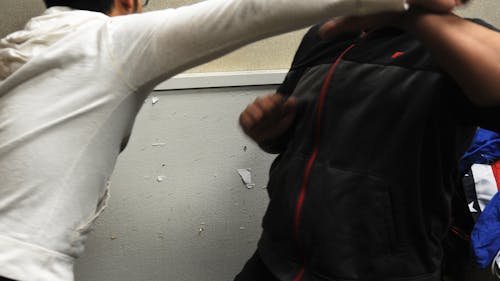Rutgers aikido club teaches students self-defense techniques

The Rutgers community receives crime alerts of attacks and burglaries that occur around the neighborhood on a regular basis, but with Kokikai Aikido, a Japanese martial arts club, students can learn to protect themselves.
Kokikai Aikido teaches the self-defense techniques of Shuji Maruyama, who founded this form of martial art. The club centers around the concept of “do no harm” and teaches counter-attacks to immobilize an attacker without harming them.
The student-run club meets twice a week on Tuesday and Wednesday in the wrestling room of the College Avenue campus gym, said Izzat Bahadirov, an instructor in the program.
The club does not learn aggressive techniques like in karate or Tae Dwon Do, said Sohyun Lee, the club’s treasurer and a School of Arts and Science sophomore.
Aikido tries to teach its students to use the attacker’s balance against them so defenders can pin them down without harming anyone, she said.
Kokikai is very relaxed and is not overbearing like other sport activities, Lee said.
“When we practice, we pair off in twos," Lee said. One (person is) the attacker and the (other is) receiver would be the one practicing the actual moves."
Kokikai is more about coordination than physical strength, and therefore being athletic and having experience in martial arts is not necessary to join the program, Bahadirov said.
The most important lesson he tries to teach to students is to find a peaceful way for conflict resolution, he said.
Bahadirov is a second-degree black belt, the dojo leader and has been part of Kokikai Aikido for 12 years.
“If somebody is trying to hurt you theoretically you have a moral right to retaliate, but Aikido puts you in a position where you can harm a person back, but you choose not to,” Bahadirov said. “Instead, you gently drop this person to the floor or immobilize them and take over the situation.”
The purpose of this is to make the attacker think trying to harm you was a bad idea, while at the same time, not harming the attacker, he said.
“I joined because it was a great way to stay fit, but it wasn't overbearing like other sport activities,” Lee said. “It’s not for people who want to compete in martial arts.”
Cynthia Zheng, the club's president and a School of Arts and Sciences sophomore, said Aikido tries to teach four principles — to relax progressively, develop calmness, correct posture and develop mindfulness.
“You can’t use brute force against brute force,” Zheng said. “Aikido teaches you to approach things more calmly.”
Aikido stresses the mental aspects of a situation rather than the physical aspects.
“A major point is keeping a calm mind and assess everything,” Lee said. “If someone grabs you in a fight, one of the main points of Aikido is 'keep calm.'”
Monica Tseng, the club’s risk manager and a School of Arts and Sciences sophomore, said the non-confrontational aspect of Aikido is what separates it from other martial arts.
“The martial art tells us how we use the attacker’s balance against them,” Tseng said. “We don't really do anything, we just redirect their kinetic energy.”
Kokikai Aikido teaches beginner students counter grabs, basic punches and side blows. Higher levels of training include countering grabs from behind and kicks, but the club stresses the concept of "do no harm." The club is also a great way for student’s to de-stress and stay fit, Lee said.
“It’s helped my academic life,” Lee said. “Sitting there on the mat in the dojo area is a good way to destress and not think about school.”
The philosophy of Kokokai Aikido is “one-mind together, forward thinking stability and poise," Tseng said.
The club has an upcoming winter camp where many members of Aikido from around the world gather, including the grand master and founder of Kokikai Aikido, Shuji Maruyama, Bahadirov said. Maruyama comes to Rutgers on occasion to run some of the classes and do black belt testing.
“I’ve never seen him in action, but how he performs the techniques is what the technique should look like,” Tseng said. “I’ve heard his techniques are just incredible.”
For students interested in joining Kokikai Aikido, all they have to do is visit the College Avenue gym where practices are held.
“We are an extremely welcoming club, anyone can come in,” Bahadirov said. “Anyone can come in, try the class and if they want to they can absolutely join.”
____
Nick Huber is a School of Arts and Sciences junior majoring in journalism and media studies. He is a contributing writer for The Daily Targum. He can be found on Twitter @njhuber95Huber.



